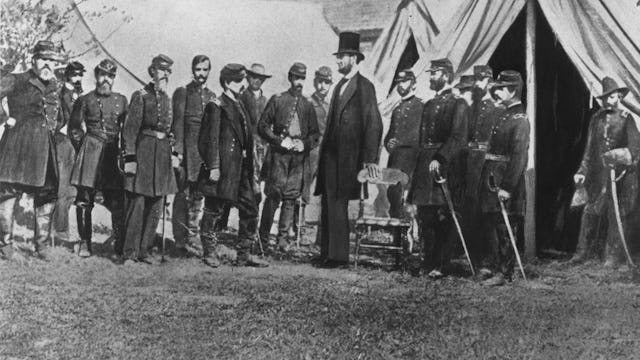Trump Asks Why Civil War 'Couldn’t Have Been Worked Out', Historians Die Inside

As an American history teacher for over a decade, I would often share quotes about the importance of history with my students.
Here’s one that I talked about with my classes more than once, from President Theodore Roosevelt: “I believe that the more you know about the past, the better you are prepared for the future.”
By this measure — if our current president’s ability to understand the past is a way of equipping us for the future — I’m afraid to say we might be screwed.
President Donald Trump’s tendency to display ignorance in the face of basic historical realities — facts that even my former middle school students would understand — is not new. For example, during a Black History Month event, he once seemed to imply that Frederick Douglass, a former slave and an abolitionist from the 19th century, was still alive today. He was accused of “shocking ignorance” after stating that Korea was previously part of China. He falsely claimed that 9/11 featured thousands of Arab-Americans celebrating in New Jersey.
But with his recent remarks about the Civil War, President Trump has really outdone himself in demonstrating alarming levels of historical illiteracy.
In an interview with Salena Zito for Sirius XM Radio, here’s a little about what our commander-in-chief had to say about the Civil War:
“I mean, had Andrew Jackson been a little later, you wouldn’t have had the Civil War. He was a very tough person, but he had a big heart, and he was really angry that he saw what was happening with regard to the Civil War. He said, ‘There’s no reason for this.’ People don’t realize, you know, the Civil War, you think about it, why?”
This brief quote reveals several layers of ignorance.
First, having a “big heart” is not a description that most historians would use to describe our seventh president. Andrew Jackson, a plantation owner with approximately 150 slaves, is best known for his white supremacist views, vengeful and volatile temperament, dislike of the anti-slavery movement, love of violent duels, and his program of ethnic cleansing (what some have called a “genocide”) of Native Americans. (Jackson’s Indian Removal Act led to the Trail of Tears, when the Cherokee were forced to give up their lands and relocate against their will, and thousands died during the journey.) Trump has shown such reverence for Jackson that he’s called Jackson an “amazing figure in American history” and hung his portrait prominently in the Oval Office.
Second, Andrew Jackson died in 1845. The Civil War began in 1861. Andrew Jackson would have had no opinion about what he saw happening during the Civil War. He could not have brokered peace between the two sides of the Civil War. Because he was, you know, dead.
Next, we absolutely do know why the Civil War was fought: slavery. Southern states wanted to keep slavery, and Northern states did not. You can read here what the Southern states themselves had to say about why they seceded from the Union over the issue of preserving slavery. (There are still “revisionists” who claim that slavery had nothing to do with why the Civil War was fought.)
And, as usual, when our president displayed levels of ignorance not previously seen before by a leader of the free world, Twitter was having none of it.
Former First Daughter Chelsea Clinton’s response:
African-Amerian Congresswoman Barbara Lee of California tweeted:
Republican strategist John Weaver tweeted:
There’s another presidential quote, one that I never shared with my students, that might fit even better than Theodore Roosevelt’s for this situation. It’s from Abraham Lincoln, the president who was actually alive during the Civil War: “Better to remain silent and be thought a fool, than to speak out and remove all doubt.”
President Trump famously doesn’t care much for reading. He is instead an avid viewer of cable news. As an educator, I would suggest that our president put down the TV remote and begin to develop a deeper understanding of history before he speaks out again. If not for his own reputation, for the future of our country. Next time, the stakes might be much higher.
This article was originally published on